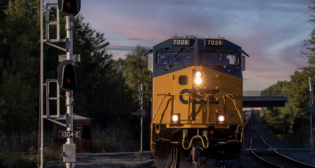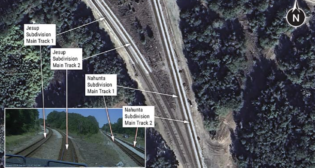
Rail Equipment Positioning Amid a Market Selloff: Cowen
Written by William C. Vantuono, Editor-in-ChiefA looming U.S. economic recession—just look at freight rail traffic figures from the past six months—and “cyclical industrial fears” have significantly impacted rail equipment equities, creating opportunities for long-term investors with what Cowen and Company analysts Matt Elkott, Jason Seidl (Railway Age Wall Street Contributing Editor) and Adam Kramer describe as “quality companies with self-forged narratives” like Wabtec, Trinity and Greenbrier.
Cowen is raising its 2019 and 2020 estimates for North American freight railcar orders to 46,100 units and 49,400 units, from 41,800 units and 47,900 units, respectively. The increase is based on several factors:
- 2Q19 orders of 11,700 units, higher than the 9,600 units Cowen had modeled.
- Continued solid demand for plastic pellets and tank cars.
- Cowen’s recent industry channel checks.
“Demand remains tempered, but our order estimates are only modestly above replacement demand of 40,000-45,000 units annually,” the analysts noted. “We are fine tuning our 2019 and 2020 production estimates to 61,300 units and 57,100 units, from 61,600 units and 57,500 units, respectively.”
“A confluence of recession and cyclical industrial concerns have pressured rail equipment valuations significantly,” the analysts said. “This creates unique opportunities for long-term investors seeking quality and compelling growth stories. Wabtec, which remains our favorite in the space, ticks both boxes, in addition to having a significant transit component that is largely non-cyclical. The company’s merger with GE Transportation doubles the rail component manufacturer’s revenues, improves its margin profile and raises barriers to entry. The company became an S&P 500 component this year, and its recent secondary offerings for the sale of GE’s 25% stake eliminate that overhang. Rail automation and tuck-in acquisitions are likely to be key growth drivers for Wabtec’s growth, longer term.”
Elkott, Seidl and Kramer describes GATX, whose North American railcar lease fleet is 120,000 units, as “one of the best operators in the railcar leasing market,” as the company “possesses a heightened ability to identify emerging industry trends and to navigate cycles. While we would remain on the sidelines largely due to what we see as less-than-compelling valuation at current levels, if a brief recession were to occur, GATX could be somewhat of a defensive play relative to other rail equipment stocks. The company’s average lease renewal term in 2Q19 was 40 months. The number of railcars scheduled for renewal in 2019 is approximately17,800, as of year-end 2018 and excluding boxcars. One potential silver lining of a recession is the possible emergence of fleet investment opportunities, although not many such opportunities arose during the most recent cyclical contraction, as low interest rates and the deployment of capital by financial investors into railcars kept valuations elevated. All this and the fact that about 80% of GATX is owned by its top ten, long-term-oriented shareholders could make the stock relatively less volatile within the rail equipment space should, recessionary conditions occur.”



